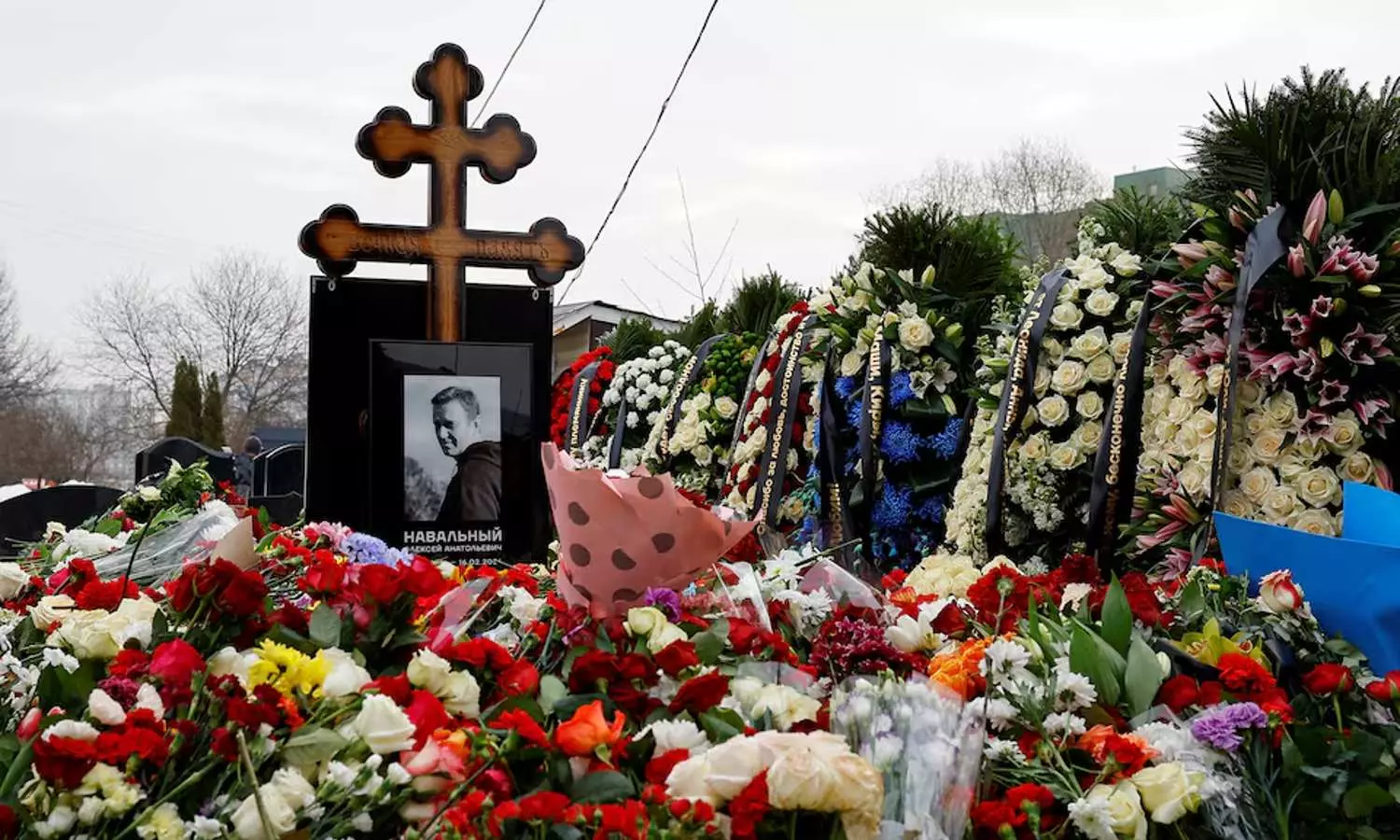'Noon against Putin': Opposition urges Russians to fulfil Navalny's 'last wish'
Andreeva’s response on her Telegram account was defiant: “I have the right to turn up when I want and vote for whoever I want.”;

Flowers cover the grave of Russian opposition politician Alexei Navalny following his funeral at the Borisovskoye cemetery
LONDON: With Alexei Navalny dead and buried in a Moscow graveyard and other anti-Kremlin politicians in exile or jailed, Russia’s opposition is at a low ebb. But on Sunday, as Russians go to the polls, opponents of President Vladimir Putin will stage a symbolic protest they hope will resonate.
In an action they call “Noon against Putin”, Navalny supporters are asking Russians who oppose the veteran Kremlin leader to go to their local polling station at exactly midday, stand in line for a paper voting slip and then vote in a way that expresses a protest or complicates the authorities’ lives.
Suggestions include spoiling the ballot paper, writing “Alexei Navalny” across the voting slip, or even voting for one of the three candidates who is standing against Putin – though the opposition regards them as Kremlin “puppets” – in a bid to reduce Putin’s vote tally.
Navalny endorsed the plan before he died in a message on social media facilitated by his lawyers. The independent Novaya Gazeta newspaper calls the planned action “Navalny’s political testament”.
Not even the fiercest Kremlin critic believes the action – which the authorities have already made clear they deem illegal – will do anything to change the fact that Putin is certain to be declared the winner of the March 15-17 presidential election by a landslide.
In control of all the levers of power, with state media at his back and with a campaign shaped around victory in the war in Ukraine and the modernisation of Russia’s infrastructure, the Kremlin says Putin enjoys overwhelming public support. Putin’s approval rating is 86%, according to the Levada Center, the country’s best known pollster.
But the Sunday protest idea, say those who support it, is to raise collective morale after Navalny’s death in an Arctic prison last month, to show Russians who oppose Putin that they are not alone, and to show the world that not all Russians back their leader.
“He (Putin) will point to his 80 or 90% but it will be possible to explain in very simple language to anyone in the world – look at the photographs, look how many people gathered at midday, in spite of all threats and repression, to show they are against Putin. So it’s a very important action,” Ivan Zhdanov, an ally of Navalny, told supporters this month.
WARNING LETTERS
Taking part, however, carries some risks.
The authorities, who view Navalny supporters as U.S.-backed extremists out to destabilise Russia and disrupt the election, have already began sending warning letters and have blocked the protest action’s official website inside Russia.
The Kremlin has made clear it regards any calls for action from Navalny’s allies – who are based outside Russia – as provocative and says police will crack down on any illegal behaviour.
Maria Andreeva, whose husband has been fighting in Ukraine and who has joined protests with other military wives demanding their men be demobilised, posted a warning letter she had received from a Moscow prosecutor sent on March 13.
The prosecutor said she was receiving the letter because she had reposted a video on her social media feed about the event.
The letter said the prosecutor viewed her action as a sign that she was preparing to take part in what it called an illegal and unsanctioned public event which “bore signs of extremist activity.” Andreeva, it said, could face the full consequences of the law if she was not careful.
Andreeva’s response on her Telegram account was defiant: “I have the right to turn up when I want and vote for whoever I want.”
The other risk for the opposition is that the turnout disappoints and its credibility is dented. With Russia’s vast landmass stretching across 11 time zones, protest voters will be scattered rather than concentrated into a single mass.
Some state companies have advised employees to vote on Friday instead of Sunday, and the authorities in some regions are organising entertainment events to coincide with the midday protest in an apparent attempt to draw people away from it.
Mikhail Khodorkovsky, an exiled tycoon and Putin critic, said this week that, if nothing else, the protest message would be noted by the tens of thousands of election officials involved in counting the votes.
Others are more downbeat. “Nobody expects that this will be the start of the revolution,” Vladimir Ashurkov, a London-based Navalny aide, said in an interview.
Andrei Kolesnikov, a senior fellow at the Carnegie Russia Eurasia Center, said Putin would get his landslide regardless.
“No vote at 12 noon can shake Putin’s legitimisation by the passive majority dependent on the state economically and politically,” he said.

